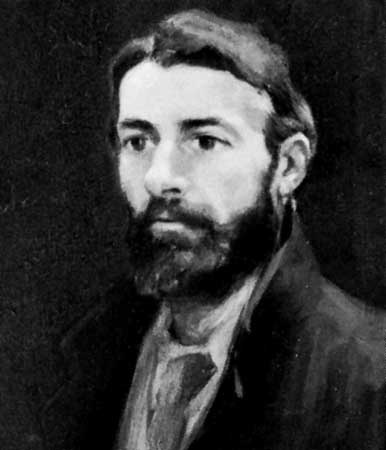Carpenter, Edward
British author
born Aug. 29, 1844, Brighton, Sussex, Eng.
died June 28, 1929, Guildford, Surrey
 English writer identified with social and sexual reform and the late 19th-century anti-industrial Arts and Crafts Movement.
English writer identified with social and sexual reform and the late 19th-century anti-industrial Arts and Crafts Movement.Carpenter was educated at Trinity Hall, Cambridge, where he was elected a fellow and ordained in 1869. In 1870 he became the theologian Frederick Denison Maurice (Maurice, Frederick Denison)'s curate. But in 1874, revolting against the social and religious conventions of his time, he became a traveling lecturer for the newly founded university extension movement, teaching in industrial towns in the north of England. In 1883 he bought a small farm in Derbyshire, where he lived until 1922.
Carpenter had long been influenced by the work of Walt Whitman (Whitman, Walt), whose verse forms he followed in his long, unrhymed poem Towards Democracy (1883; expanded 1905).
As a social thinker, he was a follower of William Morris (Morris, William), John Ruskin (Ruskin, John), and Henry Thoreau (Thoreau, Henry David) and was more interested in the reform of society and the return to rural crafts than in political revolution. His papers on social subjects (England's Ideal, 1887; Civilization: Its Cause and Cure, 1889, enlarged 1921) brought him many visitors. These papers were widely translated, as were his later works on the relation of art to life (Angels' Wings, 1898; The Art of Creation, 1904) and on relationships between the sexes (Love's Coming-of-Age, 1896; The Intermediate Sex, 1908—both influenced by Havelock Ellis (Ellis, Havelock)). Carpenter was a prominent advocate of vegetarianism, overt homosexuality, anti-industrialism, women's rights, clean air, and the value of manual labour.
Additional Reading
Tony Brown (ed.), Edward Carpenter and Late Victorian Radicalism (1990); Chushichi Tsuzuki, Edward Carpenter, 1844–1929 (1980).
- Trapp Family
- Trappist
- trapshooting
- Traralgon
- Trasimeno, Lake
- Trask, Kate Nichols
- Traube, Isidor
- Traubel, Helen
- Traun
- Trauner, Alexandre
- Traun, Otto Ferdinand, Graf von Abensperg und
- trautonium
- Trauttmansdorff, Maximilian, Graf von
- Travancore
- Travelers Insurance
- traveler's tree
- traveling salesman problem
- Traven, B.
- Traverse City
- Travers, P.L.
- travertine
- travesty
- Travis Hirschi
- Travis, Merle
- Travis, Walter